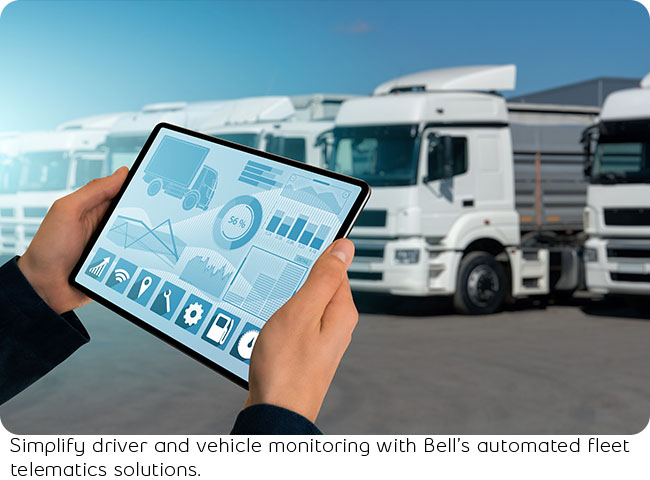Bell – BeWhere Case Study: Delivering full visibility for Musket Transport
Source: https://business.bell.ca/shop/medium-large/resource/delivering-full-visibility-musket-transport#scrollable-content-2

“If we can’t see one of our drivers and where the equipment is at all times, that’s a big safety concern. With Bell, we always know where our equipment and our people are.”
Jaime Rosa, Director of Operations and General Manager, Musket Transport
Read more: Bell – BeWhere Case Study: Delivering full visibility for Musket TransportPrecise tracking of trucks and trailers is critical to the effectiveness of Musket Transport’s operations, the security of their cargo, and the safety of the drivers. Before switching to Bell, Musket’s previous fleet tracking solution could run only on 3G. So, as networks were upgraded, there was an increasing number of dead zones where trucks couldn’t be tracked, making it harder for Musket to make key decisions in real time.
When they started losing the ability to track trucks as they drove into the United States, Director of Operations and General Manager Jaime Rosa knew the company needed a new vehicle-tracking solution. Musket had already established a great working relationship with Bell for its phone and internet services, as well as in-cab monitoring of its drivers. So Bell’s fleet management solution was an obvious choice with a trusted partner.
No running on empty
Reducing “empty miles” – the distance between a drop-off and the next pick-up – is one of the best ways for a trucking company to cut fuel costs and improve efficiency.
“Most trucking companies average an empty-mile percentage of 6-8%,” says Rosa. “I think of that as just throwing 7% of your fuel out the window. With the Bell solutions on board, it helps us to move towards reducing and improving the overall empty miles from approximately 7% to our ultimate goal of between 3-5% empty miles”
By making it easier to coordinate pick-ups as close as possible to drop-offs, vehicle tracking is critical to reducing those empty miles – especially for long-haul trips outside Ontario. Even when empty miles are unavoidable, precise tracking allows Rosa’s team to remotely reroute newly empty trucks to accommodate last-minute requests – which is much more efficient than dispatching a vehicle from their depot, and which opens new opportunities for revenue. Tracking also helps keep deliveries on schedule and ensure the safety of drivers.
Better planning, fewer delays, happier drivers

Thanks to Bell’s fleet management solution, Musket is getting closer to achieving their ambitious empty-mile target, which is having a significant impact on their bottom line. Knowing where each trailer is also allows dispatchers to inform drivers of any road conditions so that they can plan or reroute as necessary. Advance warning of potential delays, like long wait times at the border, gives drivers the opportunity to get the paperwork started ahead of time to streamline the crossing. This also manages customer expectations, resulting in an overall positive experience.
“Reducing the amount of needless driving back and forth is also huge for us,” says Rosa. “Our drivers are less frustrated when they don’t have to make their way through dense Toronto-area traffic for no reason; the customers get more responsive service and faster deliveries; and we spend less on fuel and maintenance.”
Keeping customers happy
With precise, up-to-the-minute tracking, Musket can keep customers fully in the loop so that they know where their deliveries are and when they can expect them. In case of delay, the company can notify customers immediately so that they can plan accordingly.
For local business within the Greater Toronto Area, knowing where each truck is at all times helps Musket adjust for same-day requests with optimized routes that get loads delivered faster. It also reduces losses related to misplaced assets and helps improve overall utilization.
The solution effectively completes Musket’s suite of monitoring and tracking solutions. The in-cab monitoring solution provides alerts of anomalous behaviour, such as a driver’s attention being diverted from the road for too long. The asset tracking solution ensures that they know where every cab, trailer, chassis, and other piece of equipment is at all times, improving inventory management and delivering cost savings that Musket can pass on to its customers.
Combined, these solutions offer a complete view of each driver’s location, how long they’ve been on the road, and other key indicators that the company can use to run their operations more safely and efficiently.
Staged deployment for a smooth rollout
Musket started with a pilot deployment of BeWhere tracking devices on 20 of their trailers, and then expanded incrementally as each stage of the rollout was successful. Bell worked with Musket to determine the best places on the trailer to install the trackers, and then coordinated the installation schedules to ensure minimal disruption to operations.
“The installation itself was very easy – basically plug and play,” says Rosa. “And Bell was there to support us any time we needed it.”
Once installed, the devices are unobtrusive, hard to remove, and continuously connected to Musket’s BeWhere dashboard via Bell’s highly reliable network.
Today, BeWhere is installed in 640 of Musket’s trailers, and will be installed in all new trailers going forward – including 125 trailers that they added to their fleet at the end of 2023.
What’s next
Thanks to Bell’s reliable solutions and stellar support, Rosa says the company rarely even considers other providers when looking for new technology upgrades, and he doesn’t anticipate that changing in the future.
“We have such a good relationship with Bell that we always go there first,” he says. “As long as we keep helping each other succeed, I’m happy.”

